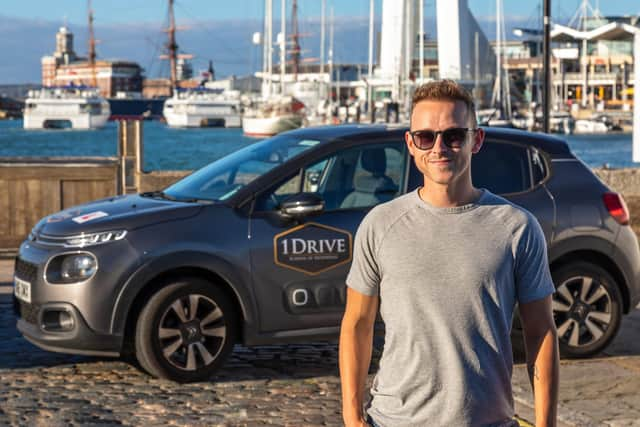Cost of living crisis: Here are 6 ways motorists can use less fuel, according to Portsmouth-based driving instructor
and live on Freeview channel 276
The price per litre has gone above £1.80 in recent weeks, with the cost of other commodities also climbing.
Driving instructor Deucalion McGregor-Sims, 30, from Fratton, runs 1Drive.
This new financial burden has hit his business hard.


Advertisement
Hide AdAdvertisement
Hide AdHe told The News: ‘The problem is fuel has gone up so significantly, you simply cannot absorb those costs.
‘You don’t want to put that onto your customers, especially when you know most of them are young adults or students.
‘You want to try and absorb as much as you can, and make it accessible to everyone, but we’ve had to put our prices up against our will.
‘It’s impossible to work around.
Many motorists will be keeping a closer eye on their fuel consumption given the increasing prices.
Advertisement
Hide AdAdvertisement
Hide AdMr McGregor-Sims has collated some tips and tricks on how to use less fuel.
Limiting journeys
Although this may not be possible for all, taking fewer trips, or doubling up on journeys instead of making individual ones, will allow you to save fuel.
However, a more significant way of being more economical is your style of driving.
Style of driving – braking less often and accelerating gently
The founder of 1Drive, which has 10 instructors, said having a gentle and measure driving style help you be more fuel-efficient.
Advertisement
Hide AdAdvertisement
Hide AdMr McGregor-Sims added: ‘Most people’s driving can improve, and the biggest thing you can do for economic driving is driving in a style that does not bring the car to a stop.
‘Make sure you read the road ahead, not just at the immediate floor.
‘If you see a traffic light turn red 200 yards away, you can progressively slow down, within reason, to try and not come to a complete stop.’
The 30-year-old said if you accelerate a car at 1mph, you can save 12 per cent of fuel, instead of setting off at a complete stop – as it requires less work to get the vehicle moving.
Advertisement
Hide AdAdvertisement
Hide AdHe added that braking gently, and not accelerating too aggressively, will save fuel.
Keeping on top of your car maintenance
Making sure your vehicle is in top condition is essential to using less petrol, diesel, or electricity.
Mr McGregor-Sims stressed making sure your tyres are fully inflated.
He said: ‘If you’re travelling on even one tyre that is deflated, it is going to create lag and be less economical, as the car is doing more work.’
Not sitting with the engine idling
Advertisement
Hide AdAdvertisement
Hide AdThe engine of your vehicle still uses fuel when it is stationary.
Mr McGregor-Sims advises that if you need to stop, turn the engine off while being idle.
The same thought applies to being stuck in traffic, so avoiding busy roads where possible is another way of saving fuel.
Not carrying excess weight
The heavier a vehicle is, the more horsepower it requires to travel at speed.
It subsequently uses more fuel.
Advertisement
Hide AdAdvertisement
Hide AdThe 1Drive found said taking anything out of a vehicle you do not need, which is heavy, is a small step to saving fuel.
He added that appliances such as roof racks make vehicles less aerodynamic, making them need more power to accelerate.
Use electric systems less
If you’re lucky enough to drive a vehicle with an economy mode, Mr McGregor-Sims suggests using it.
Some electrical systems, such as air-conditioning and radios, are very taxing on fuel economy.
Advertisement
Hide AdAdvertisement
Hide AdHe said: ‘Anything that uses electricity you use, such as blaring out music from the radio or using the air-conditioning, consumes slightly more fuel.
‘If you can have your windows open, instead of using air-con, it will undeniably save you fuel.’
The business owner added that one of his instructors did a test to see if his car would consume less fuel if the windows were open, instead of using air-con.
He found that one of his employees could complete four lessons without his fuel being impacted, with windows open, rather than half that with the air-conditioning running.
Advertisement
Hide AdAdvertisement
Hide AdMr McGregor-Sims said these little steps will save small amounts of fuel, but adding them together may make a big difference.
‘It’s all going to help, especially with the amount of money fuel costs now,’ he added.
